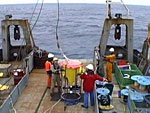Hear scientists talk about their research and effects of increased
carbon levels on ocean life. [If you are unfamiliar with playing
audio or video files, see note below].
|
|
|  Dr
Tom Trull, Antarctic Climate & Ecosystems Cooperative
Research Centre and CSIRO. Dr
Tom Trull, Antarctic Climate & Ecosystems Cooperative
Research Centre and CSIRO.
|
"Our objective is to collect a year-long
set of observations from which we can recreate the process
of CO2 absorption from the atmosphere from season to season."
Tom Trull talks about: Implications
of rising carbon dioxide for ocean life.
|
|
|
|
| 
Dr Bronte Tilbrook, Antarctic Climate & Ecosystems Cooperative
Research Centre and CSIRO
|
"We are just beginning to understand the complexities
of the phyical, chemical and biological system that drives
the carbon cycle."
Bronte Tilbrook talks about: The process
and cycle of ocean carbon uptake.
|
|
|
|
| 
Dr Richard Matear, Antarctic Climate & Ecosystems Cooperative
Research Centre and CSIRO
|
"Large areas of the ocean may become undersaturated
with aragonite due to elevated CO2 levels in the ocean which
may lead to the extinction of shell-back animals".
Richard Matear talks about: Acidification
and ocean life
|
|
|
|
| 
Mr Brian Griffiths, biological oceanographer, CSIRO Marine
and Atmospheric Research
|
"The Subantarctic Zone of the Southern Ocean is one
of the largest oceanic sinks for CO2, and the sink is due
to a combination of physical (seasonal cooling and ventilation)
and biological (primary production) factors."
Brian Griffiths talks about: Biological
production and ocean carbon levels
|
|
|
|
| 
Dr Ed Butler, Antarctic Climate & Ecosystems Cooperative
Research Centre and CSIRO
|
“We hope to get closer to knowing how micronutrients
(such as iron) influence the growth of phytoplankton at the
base of the food chain, and in turn affect carbon dioxide
uptake from the atmosphere".
Ed Butler talks about: The influence
of micronutrients on phytoplankton
|
|
|
|
|

|
Video footage from the research voyage on board the Southern Surveyor,
April 2006. Footage shows deployment of the PULSE mooring in the Southern Ocean.
Video footage only.
|
|
|
|
Note: to play the video and audio files on this page you will
need a software video player such as Quicktime
Player, or Windows
Media Player. To play the podcast files, you can also use iTunes (Mac & Windows
users).